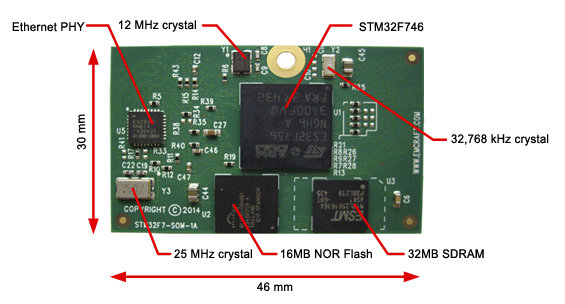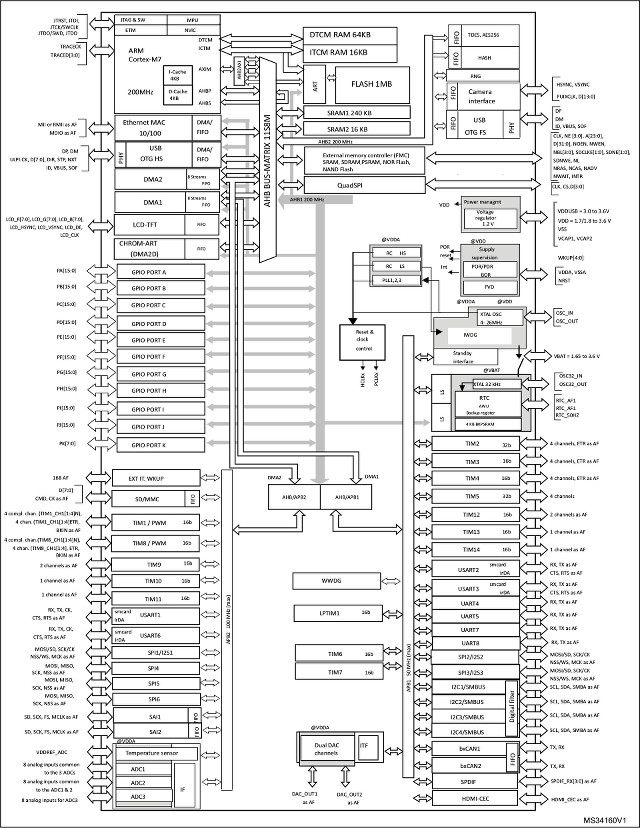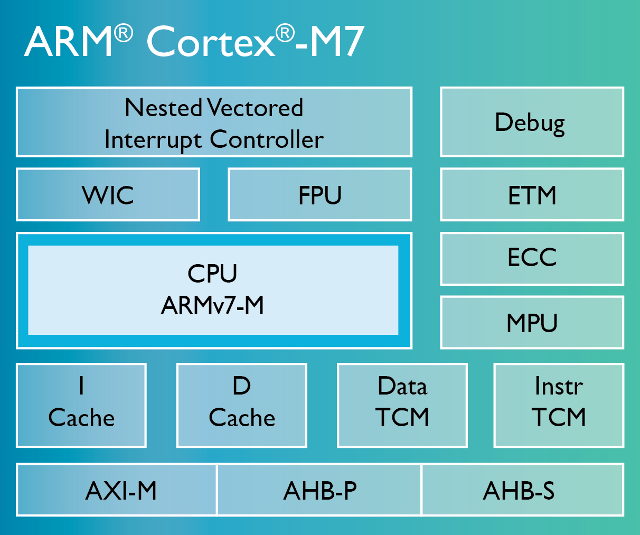STMicro announced their STM32F7 MCU family the same as ARM announced their latest ARM Cortex M7 core for high-end micro-controllers last September. Emcraft Systems have now launched a STM32F7 system-on-module with 32MB SDRAM and 16MB NOR flash, and ported uClinux to the platform. The company has also launched a STM32F7 starter kit for evaluation and development. Both target industrial automation, system and power management, wireless networking / sensors and other embedded applications. STM32F7-SOM-1A Module STM32F7 system-on-module specifications: MCU – STMicro STM32F746 Cortex M7 MCU up to 200 MHz with 320KB RAM, 1MB flash in TFBGA-216 package System Memory – 32MB SDRAM Storage – 16MB NOR flash Connectivity – 802.3 Ethernet PHY SoM connectors – 2x 80-pin (0.4mm pitch) Debugging – ARM SWJ-DP combined JTAG and serial wire debug port Misc – Watchdog, RTC, USB and other I/Os via SoM connectors Power – 3.3V DC; Low-power mode with short startup times; […]
STMicro STM32F4 (Cortex M4) vs STM32F7 (Cortex M7) Graphics Demo
STMicro announced their latest STM32F7 micro-controller family based on ARM Cortex M7 last week. As ARM Techcon 2014 is now taking place, the company has uploaded an infomercial on their YouTube account, where STMicro and ARM representatives are interviewed about the new family, and talk about its performance, power consumption, target applications, business prospects, and so on. But there’s also an a short demo with two development kits one with a STM32F4 cortex M4 micro-controller, and the other with a STM32F7 micro-controllers. Since both MCU families are pin-to-pin compatible, the hardware is identical except for the MCU. Both kits are pre-loaded with a 3D graphics demo (ray tracer), and the board with STM32F7 completes the demo in about half the time of the one with STM32F439, allegedly with about the same power consumption (7 coremarks / mW). The video is about 8 minutes long, and the demo starts at 1:25. […]
STMicro STM32F7 Series is the First ARM Cortex-M7 MCU Family
Right after ARM’s Cortex-M7 announcement, STMicro has listed STM32F7 MCU family based on the latest ARM core on their website. The family is comprised of 20 different MCUs with various flash size, packages, and with or without a crypto/hash coprocessor. The company expects their STM32F756xx microcontrollers to be used for motor drive and application control, medical equipment, industrial applications such as PLC, inverters, and circuit breakers, printers & scanners, alarm systems, video intercom, HVAC, home audio appliances, mobile applications, Internet of Things application, and wearable devices such as smartwatches. STM32F7 MCUs share the following key features: Cortex-M7 core @ 200 Mhz (1000 CoreMark/428 DMIPS) with L1 cache (4KB I-cache, 4KB d-cache) 320KBytes of SRAM with scattered architecture: 240 Kbytes of universal data memory a 16 Kbytes partition for sharing data over the bus matrix 64 Kbytes of Tightly-Coupled Data Memory (DTCM) for time critical data handling (stack, heap…) 16 Kbytes […]
ARM Introduces Cortex-M7 MCU Core for IoT, Wearables, Industrial and Automotive Applications
ARM has just announced Cortex-M7 processor based on ARMv7-M architecture, with double the compute and digital signal processing (DSP) capability of ARM Cortex M4. The latest ARM MCU core targets IoT and wearables applications for the automotive, industrial, and consumer markets including motor control, industrial / home / factory automation, advanced audio, image processing, connected vehicle applications, and so on. Cortex-M7 comes with enhanced DSP instructions, a better FPU (FPv5 with single and double precision support), and tight coupled memory compared to Cortex-M4, according to an Anandtech article. ARM Cortex-M7 also achieves 5 CoreMark/MHz against 3.41 CoreMark/MHz for Cortex M4, and up to 3.23 DMIPS/MHz against up to 1.95 DMIPS/MHz. ARM Cortex-M7 features listed in the press release: Six stage, superscalar pipeline delivering 2000 Coremarks at 400MHz in a 40LP process. AXI interconnect (supports 64-bit transfer) and fully integrated optional caches for instruction and data allowing efficient access to large […]






